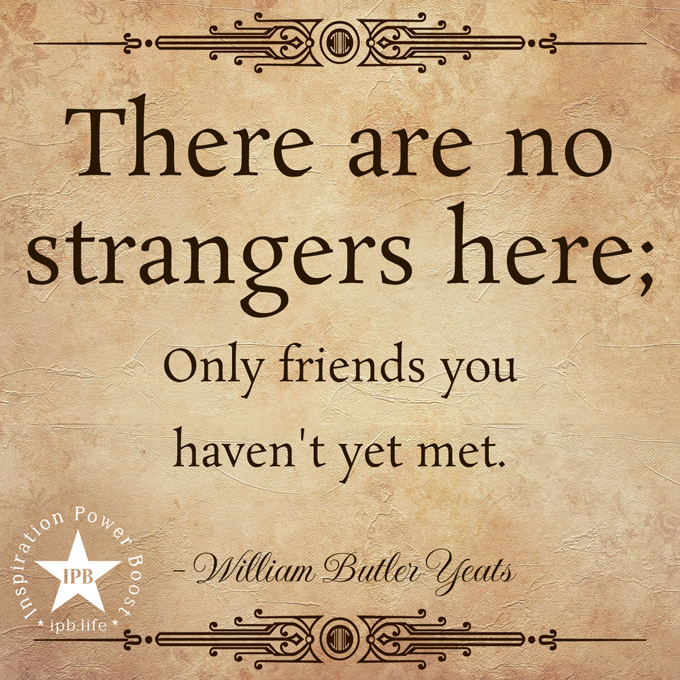
Graphic © InspirationPowerBoost.com (with permission)
“There are no strangers here; Only friends you haven’t yet met.” – William Butler Yeats
The Essence of Human Connection
In a world where divisions often seem more pronounced than connections, Yeats’ words serve as a poignant reminder of the inherent bond shared by all humans. The quote underscores the idea that every individual we encounter has the potential to become a cherished friend, if only given the chance. It speaks to the universality of human experiences, emotions, and desires. By approaching others with an open heart and mind, we can discover shared stories, dreams, and aspirations, turning strangers into friends and enriching our own lives in the process.
William Butler Yeats: A Poet of Profound Connections
William Butler Yeats was a celebrated poet whose works often delved into themes of love, nature, and the human spirit. Yeats believed in the power of art to forge connections, both between individuals and between an individual and the larger world. His belief in the interconnectedness of all things is evident in his writings, and this particular quote exemplifies his view on human relationships. For Yeats, every person held a universe of experiences, waiting to be explored and understood.
William Butler Yeats, one of the foremost figures of 20th-century literature, was born in 1865 in Sandymount, Dublin. Throughout his life, he wore many hats: poet, playwright, and fervent nationalist. Yeats was deeply influenced by both the rich folklore of his native Ireland and the emerging modernist movements of his time. His poetry evolved over the years, transitioning from the lyrical romanticism of his early works to the stark, modernist style of his later poems. This evolution reflected not only his personal growth but also the tumultuous times he lived in, marked by Ireland’s struggle for independence.
Yeats was not just confined to the literary world; he played an active role in the political landscape of Ireland. A staunch advocate for Irish nationalism, he was deeply involved in the Irish Literary Revival, a movement that sought to create a distinct Irish literature that drew from the country’s rich folklore, myths, and traditions. His efforts, alongside other literary figures, led to the establishment of the Abbey Theatre in Dublin, which became a beacon for Irish drama. Yeats’ dedication to the Irish cause also saw him serve as a senator in the newly established Irish Free State in the 1920s.
Beyond his literary and political contributions, Yeats was also deeply interested in mysticism, the occult, and spiritualism. These interests often found their way into his writings, adding layers of symbolism and depth. His exploration of the ethereal and the tangible, the personal and the universal, earned him the Nobel Prize in Literature in 1923. Recognized for his “always inspired poetry,” Yeats left behind a legacy that continues to inspire writers and poets worldwide. His works, imbued with passion, nationalism, and mysticism, stand as a testament to a life dedicated to both art and country.
The Global Village
The concept of the world as a “global village” has been discussed for decades, emphasizing the interconnectedness of humanity. With the advent of technology and communication tools, geographical distances have shrunk, making it easier for people from diverse backgrounds to interact and form bonds. This global interconnectedness echoes Yeats’ sentiment. Throughout history, explorers, traders, and travelers have ventured into unknown lands, often discovering that beneath cultural and linguistic differences, human emotions and aspirations remain strikingly similar. These tales of exploration and discovery underscore the truth in Yeats’ words: every stranger holds the potential to become a friend.
Daily Affirmation
“Today, I choose to see the friend in every stranger, recognizing the shared human spirit that binds us all.”
Further Inspirational Quotes
“We are all so much together, but we are all dying of loneliness.” – Albert Schweitzer
“Each friend represents a world in us, a world possibly not born until they arrive, and it is only by this meeting that a new world is born.” – Anaïs Nin
“Strangers are just friends waiting to happen.” – Rod McKuen
😳 What Tinnitus Does To Your Brain Cells (And How To Stop It)
After 47 years of studies and countless brain scans done on more than 2,400 tinnitus patients, scientists at the MIT Institute found that in a shocking 96% of cases, tinnitus was actually shrinking their brain cells.
As it turns out, tinnitus and brain health are strongly linked.
Even more interesting: The reason why top army officials are not deaf after decades of hearing machine guns, bombs going off and helicopter noises…
Is because they are using something called "the wire method", a simple protocol inspired by a classified surgery on deaf people from the 1950s...
★ How To Get Rid Of Nail Fungus:
★ Does Your Salad Contain This Vegetable?
★ Top 10 Most Valuable Medicinal Herbs:





